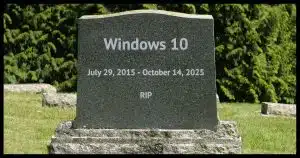It didn’t before… and it likely won’t again.

This is based on an article I wrote 10 years ago after Windows XP’s end-of-support date (April 2014) had come and gone.
While there had been many warnings of dire consequences, nothing happened.
So here we are again with Windows 10 end-of-support on the horizon (October 2025), and I have déjà vu.

A disaster is not pending
Despite dire warnings, Windows XP’s end-of-support date passed without disaster. Similarly, Windows 10’s end of support probably won’t be catastrophic either. While upgrading to Windows 11 is advisable, you can take time to transition or enhance security measures without immediate panic.
Dire predictions
Once again, there are dire warnings that The End is near as we head into Windows 10’s end-of-support date. Hackers could save known exploits to unleash on the world shortly after the deadline passes.
But that didn’t happen to Windows XP, and it seems unlikely to happen to Windows 10.
Help keep it going by becoming a Patron.
Why I rarely panic
As with most news these days, headlines and stories are full of hyperbole and sensationalism to get our attention and clicks.
And, of course, companies with an agenda (for example, Microsoft wanting people to upgrade to Windows 11) often take part in over-the-top predictions (at least look the other way).
Knowing that this is how the world works, I choose to take a more laid-back, “believe it when I see it” approach. The media, press, and tech industry have cried wolf too many times for me to take their warnings seriously right away.
That’s kind of sad. Like the villagers in the story of the boy who cried wolf, we’re all much less likely to pay attention when there’s a genuine problem.
It’s time to move on if you can
Now, don’t get me wrong. I believe upgrading to Windows 11 is the right thing to do (assuming your machine supports it).
As I outlined in an article about unsupported software, you take on additional risk if you continue to use Windows 10 after its end-of-support date. The safest solution is to move on to a supported version of Windows — or any operating system, for that matter.
But knowing that it’s unlikely to be the apocalypse that so many predict means you have important alternatives.
For one thing, you have time to decide what to do. You have time to see what others have done and decide accordingly. You have time to save up for a new machine if you so desire. You have time to try different operating systems, like Mac or Linux. You may even have time to wait for Windows… 12?
You even have time to wait until you’d normally get a new machine. It’ll come with the current version of Windows pre-installed.
You also have time to balance or mitigate the risk. Rather than switching immediately, you can bolster your security in other ways, perhaps by limiting how you use your machine or finally putting that comprehensive backup plan you’ve been meaning to set up into action.
To be fair, it could still happen
The disaster scenario could still happen.
There is one important difference between the end of Windows XP and the end of Windows 10: the number of computers involved. Because of Windows 11’s hardware requirements, it seems that there will be more Windows 10 machines unable to upgrade to Windows 11. I’m not sure how likely it is, but it is possible that a Windows 10 vulnerability could be discovered in the weeks or months after its end of support. That vulnerability could allow bad things to happen. We don’t know. What we know is that it didn’t happen to Windows XP or Windows 7.
What we also know is we won’t be able to count on Microsoft to fix the vulnerability. After this long, it would have to be pretty serious, and I’m guessing that the bar would be extremely high for them to even consider studying or fixing such a vulnerability.
Eventually, we also won’t be able to count on our anti-malware tools to protect us. Their support for Windows 10 will slowly wane. And even in the best of circumstances, anti-malware tools can’t protect you from everything.
Do this
I still believe that moving on from Windows 10 to a supported OS is the best choice overall.
However, if you can’t or simply don’t want to, know that apocalypse is unlikely.
If something does come up, I’ll let you know what to do. Subscribe to Confident Computing! Less frustration and more confidence, solutions, answers, and tips in your inbox every week.


One of the best protections against malware is a good backup regime.
How Do I Back Up My Computer?
If you find you’ve been hit with malware, you can restore from the last healthy backup. Unfortunately, once there are no longer antimalware programs that support Windows 10, the malware might be undetectable. That’s when it migh be a good idea to switch to Linux.
I have read many articles about Microsoft’s inserting of ads into Windows 11’s menu and other screens. Is this accurate, and if so, is there a means of blocking them? I am inundated with ads via the internet and every other system of technology. I paid for Windows 10 when I bought the PC. I refuse to put up with unsolicited ads.
Dear Leo,
If possible, could you explain why Windows 11 will not run on my Windows 10 machine. I did run the compatibility program, and it said it wouldn’t. Mine is a custom-built gaming computer, couldn’t I just have the computer updated so that it can run Windows 11? My computer is built in a 15-year-old Asus tower case, and 5 years ago everything inside was replaced with new hardware to run Windows 10.
It would be interesting to understand the new hardware requirements.
Thank you, EGT, Paxton MA
I can’t explain, but I can point you at the requirements: https://learn.microsoft.com/en-us/windows/whats-new/windows-11-requirements
Be sure and look a the full list of supported processors to see if yours is or is not on it.
In many cases, you can download Windows 11 from Microsoft and install it.
Where Can I Download Windows 11? Or 10? Or 8?
I did that, and it worked, but it ran too slow so I restored Windows 10 from a backup. I suggest backing up so you can roll back the installation if there are problems.
How to Back Up Before a Windows 10 Upgrade
As I understand it, Windows 11 requires features found only in newer CPUs to provide modern security features. It requires a TPM2 hardware/firmware (usually included in these modern CPUs) module to enhance security at boot time.
I hope this helps,
Ernie (Oldster)
Hello Leo,
You are perfectly right ! I ignored the catastrophic predictions about the end of XP and I still have a few XP PCs…
I have not seen swarms of viruses, worms or anything else descend on it, nor have I suffered any virulent attacks.
The only problem I encounter is that many applications no longer offer their updates in XP version, and I have to make do with the old versions that I have.
Therefore, I am calm about the idea of not upgrading my fleet of machines to W11 – most of which do not have the required configuration!
And then, I’m really fed up with changing all my habits, all my hard-won reflexes, just because MS has decided to shake up its interfaces, replace the “old” shortcuts, etc.
W10 rules!
Just last week I finally parted with my Windows XP machine. It was sad. I was not too concerned about getting hit by malware, but I was running Panda Security realtime.
I’m still running several Windows 7 machines and the Security Essentials still updates for malware definitions. Fast, stable, and no bricking, copilot, recall, store, xbox, ads, or other pests.
It’ll be a long, long time before Windows 10 is unusable.
Yep, not a disaster.
As a rule of thumb, I never install software that is no longer supported by the developer/owner, including Windows itself. If it doesn’t get security updates, I don’t want it on my systems, but that’s my choice. Others may feel differently, and that’s O.K.
IIRC, Windows 10 reaches EOL in October 2025. On the following patch Tuesday (November 2025), if it doesn’t get an update, I’ll remove it from my older laptop PC, and make that machine a GNU/Linux-only device. I’m an experimenter, and my current plan is to see if I can install Windows 11 on that machine to see how well it runs there. Failing that/if Win-11 doesn’t run satisfactorily, I’ll install a few GNU/Linux distributions to see which runs most stably/best, and suites me.
Ultimately, that machine may become an experimental platform for me to pursue new adventures (experiments) so I don’t Bork my desktop/primary laptop PCs as often :). To be honest, I’m looking forward to what the future brings post-Windows 10.
Ernie (Oldster)
Of course, that’s the safest option. Unfortunately, many people can’t afford to decommission an older machine and get a new one. In fact, many people who can afford a new machine prefer to use their money for something else whne thir old computer is working fine.
As an experiment I successfully installed Windows 11 on an old 2nd generation Intel laptop and made it a Plex server. The installation process involved a couple of registry hacks but otherwise ran smoothly and performance was quite acceptable. It was an interesting experiment. 🙂
Couple of questions/comments, if I may:
My firend, oldtimer like me or you who does to my box what is beyond me, mentioned the deadline has been moved. Is it true?
He just by the way installed win11 on an incompatible notebook, which I am now struggling with to make usable.
Since MS Works on floppies I traditionally have stuck with what I have – as long as it works. Which inevitably will not, sooner or later. Skipped quite a few “must have” win versions, very late to win10 from win8.1 only when programs I depend on refused. I follow AskWoodyPro closely and have had no issues with win10 that way, and will hang on as long as my win10 box does what I need.
Look after yourself well Leo, and only the Best of Luck to you!
I’ve not heard of the date moving.
I’ve recently been lamenting the moment I switched from Winedaze XP. It’s probably just the government interference that has destroyed computers and the internet. But I distinctly remember getting stuff accomplished with XP. I don’t know the date, but I’ve been trying to get to where I was the day before I foolishly switched from XP.
– I’m looking at getting three computers: 1 for internet, 1 for transfers, and 1 to hopefully be able to do something useful, with XP.
You might be a candidate for Linux. Boot from a live Linux bootable disc and see if you can do what you need to do with it. Use it for a few days or weeks.
Linux Mint is generally easiest for switching from Windows because Mint’s user interace is more similar to XP’s than XP’s is to Windows 7 and later versions.
In fact, you might be better off with an older OS.
A Windows version from 1992 is saving Southwest’s butt right now
(Disclaimer this isn’t a recommendation)